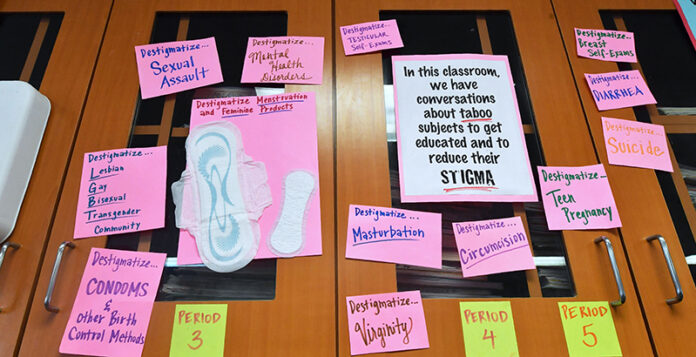
By: Laura Fay
Publisher: the74million.org
Date: April 1, 2019
Maeve Sanford-Kelly was in middle school in 2016 when Bill Cosby, Brock Turner and the Access Hollywood tape associated with then-candidate Donald Trump dominated headlines. Distraught but motivated, she worked with her mom, Maryland state lawmaker Ariana Kelly, to write and pass legislation requiring students to learn about consent in middle and high school.
“Why don’t our schools teach us that this is not how we treat people?” she asked lawmakers at a hearing for her bill last year, which initially failed but went into effect last summer. “We cannot spend one more day allowing people to grow up and continue this culture of predatory behavior.”
Since 2016, the #MeToo movement has exploded, toppling dozens of powerful people for allegations of sexual harassment and assault. That movement is affecting classrooms too, as lawmakers and educators look to teach students about consent and how to refuse unwanted sexual advances. However, what students learn varies widely across the country, and adults disagree about what sex education should include.
Experts say that more comprehensive sex education could change the culture in the United States by preparing students for healthy relationships and preventing sexual violence. A new study shows that learning refusal skills can protect students from later sexual assaults, which researchers say indicates that improving sex ed should be the next step for the #MeToo movement — a way to both protect students from being victimized and prevent them from perpetrating assaults.
“If administered properly, sex education that’s comprehensive has a unique power to really create a culture shift in this country,” said Jennifer Driver, state policy director at the Sexuality Information and Education Council of the United States, a nonprofit that advocates for comprehensive sex education. RELATEDJust 24 States Mandate Sex Education for K-12 Students, and Only 9 Require Any Discussion of Consent. See How Your State Stacks Up
Sex education’s ‘revolutionary’ power
Because it differs so widely from classroom to classroom, the power of sex education is largely going untapped, said Nora Gelperin, director of sexuality education and training at Advocates for Youth, a nonprofit organization that presses for comprehensive sex ed.
“These days, kids are really lucky if they receive good quality sex education, because so many do not,” Gelperin told The 74.
Her organization defines quality sex education as “information about sex, sexuality, relationships, contraception and condoms, and how to protect yourself and plan your future.”
“Sex education done well, high-quality sex education, is really pretty revolutionary in terms of helping people feel good about their bodies, understanding how to have healthy intimate relationships,” Gelperin said.
Research backs her up.
In a recent study that one expert called “hugely significant,” researchers at Columbia University found that students who had received refusal skills training were about 50 percent less likely to experience penetrative sexual assault when they got to a college campus. Abstinence-only education did not have the same effect, according to their survey results published in November.
It just makes sense that better sex ed would result in better outcomes for students, John Santelli, the lead author on the study, told The 74.
For example, learning refusal skills “before you’re in a charged situation” — such as a college dorm room after a night of drinking — will help students know how to react, Santelli said. “Getting prepared ahead of time always makes sense.”
About 54 percent of students surveyed said they had learned refusal skills before they arrived on campus, most of them as part of comprehensive sex education in middle and high school. However, the researchers note that students “generally described sex ed as awkward and focused on STIs, HIV, and pregnancy and contraception (mostly condoms).” Experts say sex ed varies widely across the country and truly comprehensive programs are rare.
The Columbia study was the first to analyze a possible relationship between sex education and sexual violence. The researchers concluded that explicitly learning refusal skills was a protective factor. Other factors such as adverse childhood experiences, gender and sexual orientation also affect risk of assault.
Abstinence-only education, often called sexual risk avoidance, did not have the same effect in the Columbia study.
However, Mary Anne Mosack, an advocate for sexual risk avoidance, said that approach has included consent and refusal skills for decades. Mosack is president of Ascend, an organization that advocates for sexual risk avoidance education and trains educators to teach it.
“It’s actually not a new concept, but it’s a very useful one and one that we’ve employed for many years,” Mosack said about refusal skills.
Culture shift
Paired with the growing #MeToo movement, the Columbia report could shift the culture around sex education.
“We just recently really started to move into a culture where we’re identifying that sexual assault and violence prevention should be a part of sex education,” said Driver of the Sexuality Information and Education Council of the United States.
The way adults view teen sexuality could also change as a result of the study, historian Jonathan Zimmerman told The 74.
Although the survey was limited to current students at Columbia University and Barnard College ages 18 to 29, the findings are “hugely significant” and “incredibly promising” in part because the existing research on sex ed is narrow, according to Zimmerman, a professor at the University of Pennsylvania Graduate School of Education who has written a book about the global history of sex education.
“There is obviously much more attention to the question of consent, and I think that could have some very dramatic consequences, because it could … signal a new acceptance of young people as sexual beings, as sexual actors,” he said. “You can’t talk about somebody sexually consenting really unless you imagine them as a sexual actor. I think consent implies that.”
Previous iterations of sex ed mostly focused on telling students what to do and what not to do, rather than giving them information to make their own decisions, Zimmerman said.
#MeToo could change that.
Sex education frameworks that mostly focus on risk avoidance and preventing things like pregnancy and HIV do not consider students as having much agency in their sex lives, Zimmerman said.
“On the one hand, the #MeToo moment and everything that attaches to it has honestly led to more demand for instruction about that subject, about consent, about boundaries, about sexual autonomy, and so what that suggests is … more attention on the question of teens as sexual actors,” he told The 74.
On the other hand, Zimmerman added, increasing diversity can make it more difficult for communities to come to a consensus about what school discussions of sex should look like for their kids.
“So I do expect there to be more attention to this issue,” Zimmerman said, “but I also expect there to be more pushback.”RELATEDWith an Eye Toward Consent, Students Seize the Moment to Overhaul Sex Ed
Competing approaches to sex ed
While a growing movement for more comprehensive sex education is taking hold in the #MeToo era, its impact is spotty around the nation. States and communities take wildly different approaches.
“Sex education still remains a real patchwork with really big variability not only from state to state” but also within districts and schools, Gelperin said.
Only 24 states require sex education. Of those, just 10 require that instruction be medically accurate, according to the Guttmacher Institute, a research center focused on advancing reproductive rights. Twenty-six states don’t mandate sex education at all, though three require that sex education be medically accurate if it is taught.
“What the research shows pretty clearly is abstinence-only [education] doesn’t result in lower rates of teen pregnancy, lower rates of teen sexual activity — it’s not effective in promoting abstinence. In fact, a more comprehensive approach achieves those goals,” said Catherine Brown, a researcher at the left-leaning Center for American Progress.
A report published in 2017 by the Journal of Adolescent Health states that “abstinence-only-until-marriage programs” are “scientifically and ethically flawed” and urges the United States to end them in favor of “medically accurate, evidence-based, and scientifically justified approaches to sexuality education for young people.” (One of the authors of the report was John Santelli, the lead investigator on the Columbia study.)
On the other side of the debate, advocates for sexual risk avoidance education, sometimes called abstinence-only, argue that their approach mirrors that used to discourage students from underage drinking and using illegal drugs and point to “success sequencing” — completing education, getting a full-time job, getting married and only then having children — as a proven way to guard against poverty.
Brown said the evidence is clear that comprehensive sex ed programs are more effective than abstinence-only ones at delaying teen sex and preventing unwanted pregnancy. But, she added, the goals of both types of programs are usually the same — to delay sexual activity and prevent pregnancy and sexually transmitted infections among teens.
Still, the question of how to teach kids about sex remains controversial.
“It shouldn’t bring out such hot feelings because there really are evidence-based answers to these questions, but sometimes it does,” Brown told The 74.
Both camps claim parent support for their ideas. A majority of American adults have consistently supported comprehensive sex ed in schools, according to polling data compiled by the Sexuality Information and Education Council of the United States. However, a survey commissioned by Ascend found in 2016 that 71 percent of Americans think sex education should give students “a message that uses practical skills to reinforce waiting for sex.” Support for a focus on abstinence increased when respondents were informed that “a majority of teens are not sexually active.”
Source: https://www.the74million.org/article/rethinking-sex-ed-for-the-metoo-moment-a-hugely-significant-study-shows-that-strengthening-education-on-relationships-consent-can-change-the-culture/
Comment: I believe this article does a nice job of emphasizing one thing to the readers. Teens going through Sex Education truly are autonomous and free agents in their own lives. They are more grown up than what we perceive them to be and they desire proper education. I think this affects our work, because it shows us that we can design a program that is mature and still expect teens to understand it and adopt its values if they find it valid.



